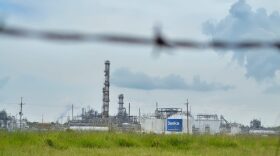-
After a proclamation from President Donald Trump, two facilities located in LaPlace, Louisiana will be allowed to ignore federal regulations meant to curb harmful pollutants.
-
It’s a type of plan that environmentalists, scientists and the U.S. Environmental Protection Agency (EPA) says can be a useful tool. But whether the program is fully set up for success isn’t yet certain.
-
Community groups are suing the Louisiana Department of Environmental Quality over a new law that could prevent them from publicly sharing their air monitoring data.
-
Residents fighting against pollution from a nearby petrochemical plant are both relieved and disappointed after it suspended production.
-
A former EPA official warns exemption for some coal-fired power plants could be the first step toward gutting pollution rules for all plants.
-
People living in Louisiana’s petrochemical corridor say they’re worried about air pollution under the Trump administration. The EPA says companies can request presidential exemptions from Clean Air Act rules.
-
Residents of the mostly Black communities sandwiched between chemical plants along the lower Mississippi River have long said they get most of the pollution but few of the jobs produced by the region’s vast petrochemical industry.
-
A federal appellate court says a civil rights lawsuit alleging a south Louisiana parish engaged in racist land-use policies by placing polluting industries in majority-Black communities can move forward.
-
Communities living and learning near petrochemical plants will face more pollution and less federal protection under Trump’s new policies.
-
President Trump is reversing his predecessor’s efforts to clean up areas hardest hit by pollution from heavy industry, ports and roadways – communities that are often largely Black, Latino and low-income. He eliminated the “Justice 40” initiative the Biden created which required 40% of the benefits from certain environmental programs go to hard-hit communities. He disbanded a team of White House advisors who focus on the issue. It's part of a spate of early executive orders that align with Trump's campaign pledge to slash regulations and eliminate an emphasis on diversity, equity and inclusion. The new administration actions end a short-lived federal embrace of environmental justice.

Play Live Radio
Next Up:
0:00
0:00
Available On Air Stations









